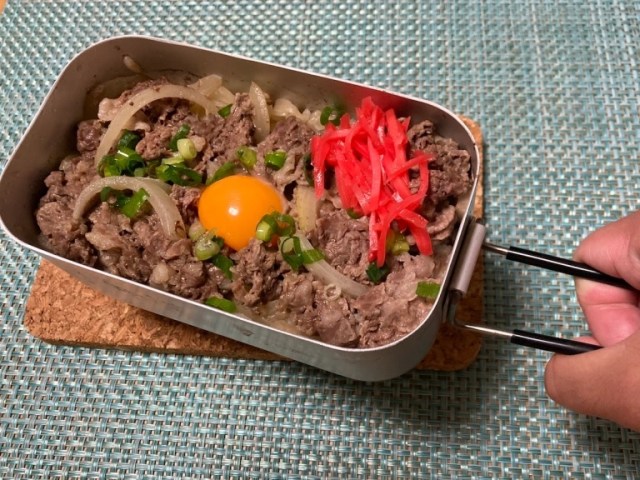
An outdoor cooking recipe that’s too good to wait until your next camping trip to try.
There’s a simple purity to Japanese rice bowls. You’ve got everything you need in a single bowl, with all the ingredients’ flavors mixing together into a delicious and nourishing harmony.
Of course, even if you only need one piece of tableware to eat a rice bowl, you need all sorts of pots and pans to make the rice bowl right? Not necessarily, because we’ve got a recipe that lets you cook an entire gyudon, or beef bowl, in a single pan that you can eat out of. And yes, that means that you don’t even need a rice cooker! All you need is a mess tin, of the type you can get from any camping or outdoor goods supplier.
Ingredients:
● Rice (144 milliliters [4.7 ounces])
● Water (180 milliliters [6.1 ounces])
● 4-times concentrated mentsuyu bonito broth stock (2.5 tablespoons)
● Mirin cooking sake (1 tablespoon)
● Beef (150 grams [5.3 ounces])
● 1/2 onion
● 1 egg yolk
● Pickled ginger (to taste)
● Green onion (to taste)
Once again, this recipe comes from Japanese YouTuber chef Ken Outdoor Cooking, and while it’s originally meant to be made while camping, there’s nothing stopping us from using it to whip up some super-easy, ultra-tasty gyudon at home too.
Step 1: Pour the rice and water into the mess tin and let it soak for 30 minutes.
Step 2: Slice the onion.
Step 3: Cut the beef into strips approximately two centimeters (0.8 inches) wide.
Step 4: Once the rice has soaked for 30 minutes, pour the mentsuyu and mirin into the mess tin ad give it a few light stirs.
Step 5: Toss in the onions and beef. In particular, you want to make sure the beef is evenly distributed so that all of it gets properly soaked with the broth’s flavor.
Step 6: Now it’s time to close up the lid and start cooking.
If you’re using a block of solid cooking fuel, Ken says you can just let it go until the fuel is used up. On the other hand, if you’re using a gas burner, you want to start off cooking on medium heat for the first 10 to 15 minutes, then switch to low heat for another 10 minutes. That might seem like a long time, but gyudon beef is a type of nimono, traditional Japanese simmered dishes, and so the cooking process is a slow and steady one.
▼ Since the contents are simmering, you might want to place something on top of the mess tin to keep the lid from lifting up while the heat is on.
Step 7: Once the cooking is done, wrap the mess tin in a towel to let it steam for a final 15 minutes.
Step 8: At this point, the gyudon aroma should be becoming unbearably enticing. Luckily, it’s almost ready to eat, so carefully remove the mess tin’s lid, making sure not to singe your fingertips.
Step 9: If necessary, spread out the meat to smooth away any clumped sections, then pour your egg yolk in the center.
This is actually an optional step. Some people prefer their beef bowl without egg, and that’s fine. For those who do appreciate the eggy extra, though, Ken says that the heat of the gyudon itself will be enough to cook the yolk.
Step 10: And last, add as much pickle ginger and green onion as you like. This is also an optional step, since while they add some nice color to the presentation, some people would rather enjoy the straightforward flavor of the beef, onion, and rice without any extra intrusions on their palate.
▼ Finished!
Now all that’s left to do is dig in! If you added the egg yolk, it’s a good idea to break it up with your chopsticks right at the start of eating, in order to maximize its reach and help it receive the rice’s heat.
▼ Ken’s video demonstration
Including the time for the rice to soak, the whole meal-prep process takes about 60 minutes. But though the recipe doesn’t provide instant gyudon gratification, there’s really only about 10 minutes of active work on your part involved. That means you’ve got plenty of time to put up your tent and look through the photos you took while hiking and building up an appetite as your dinner is cooking, or to just relax on the sofa and crack open a cold one if you’re giving yourself a taste of this delicious outdoor recipe while staying at home.
Reference: Ken Outdoor Cooking
Photos © SoraNews24
● Want to hear about SoraNews24’s latest articles as soon as they’re published? Follow us on Facebook and Twitter!
[ Read in Japanese ]

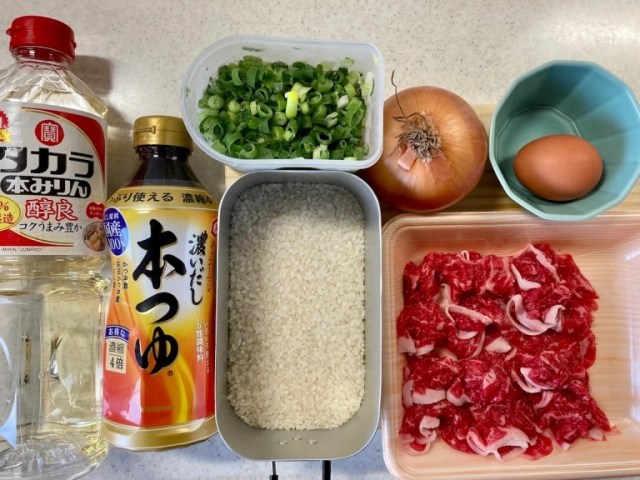
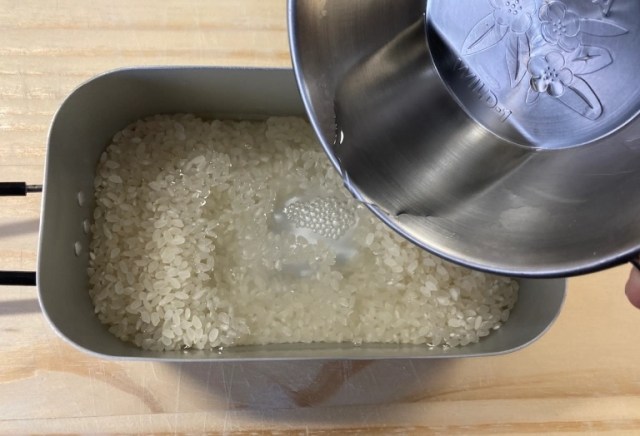
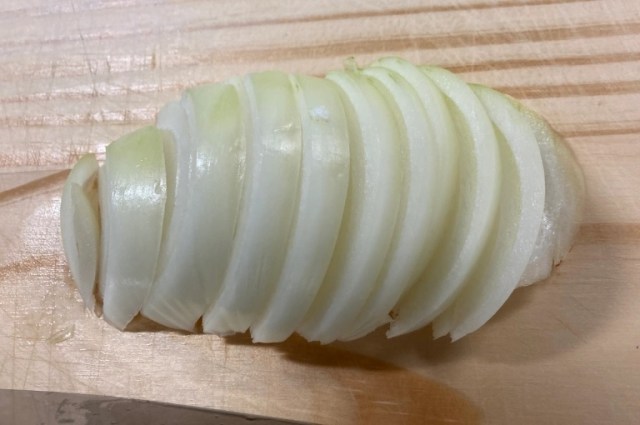
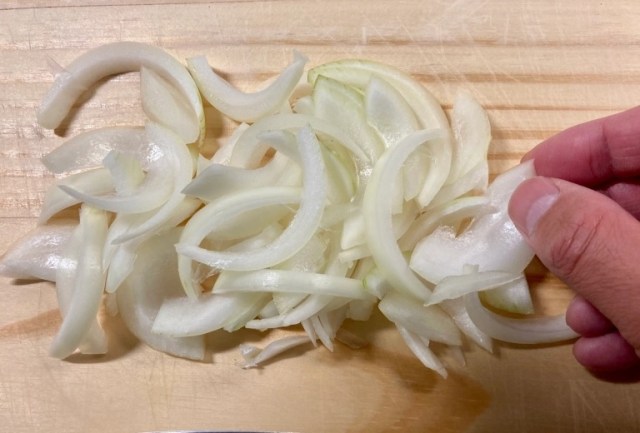

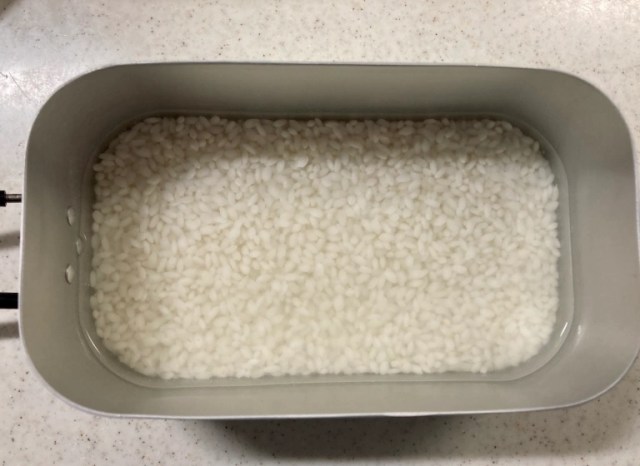
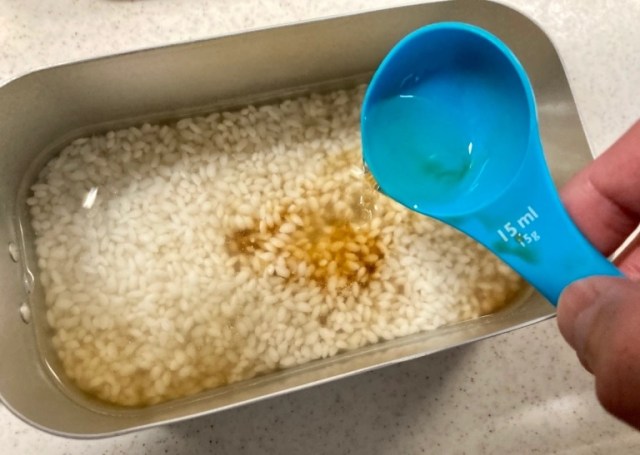
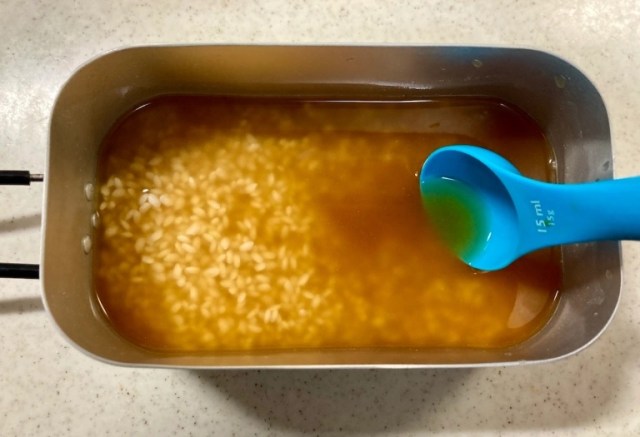
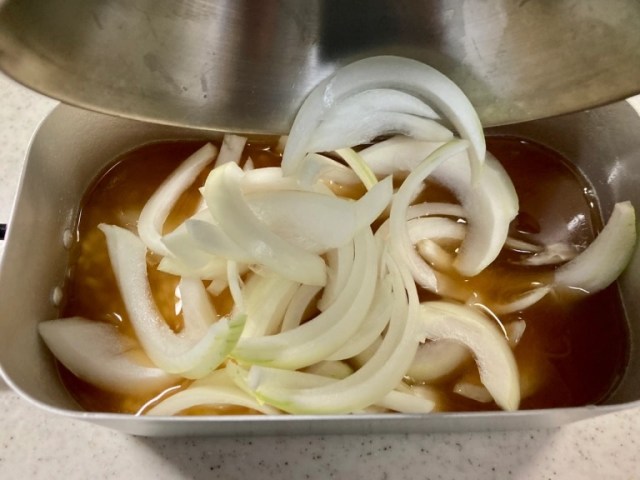
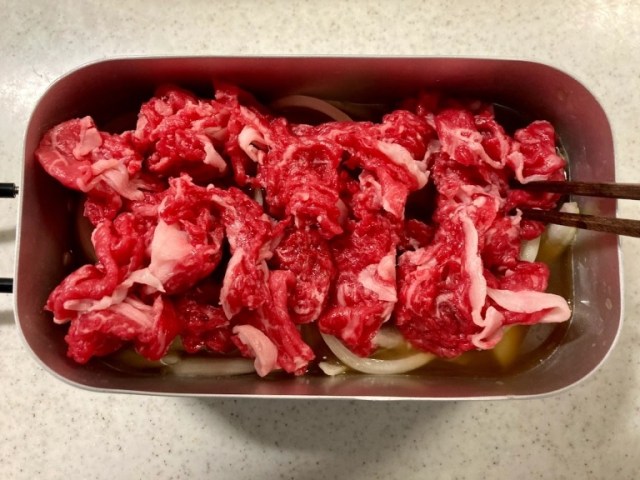
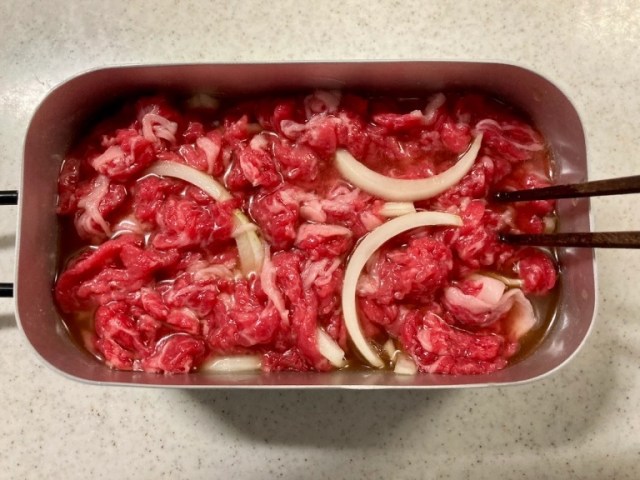
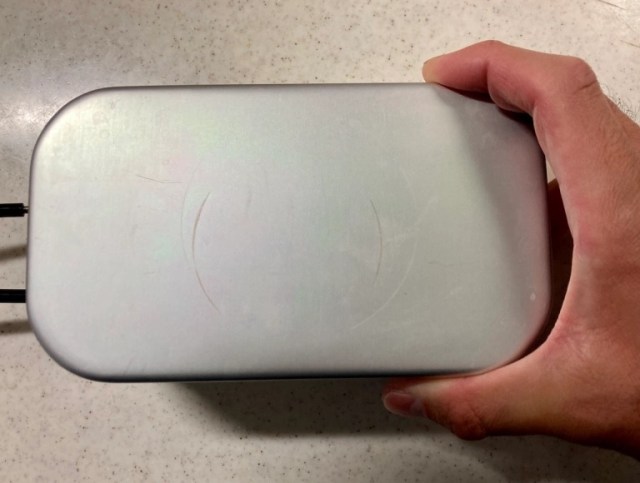
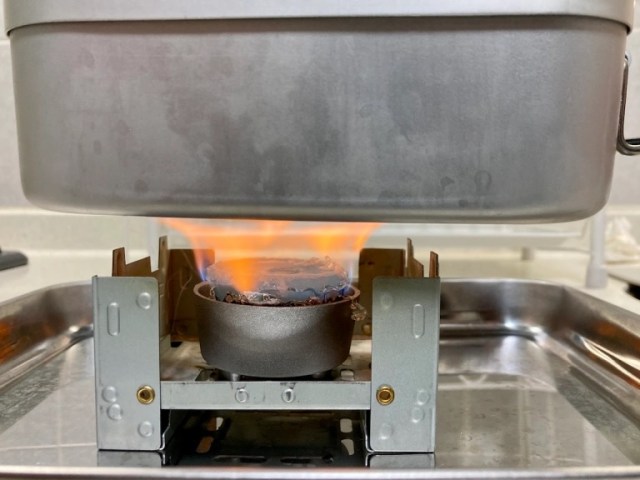
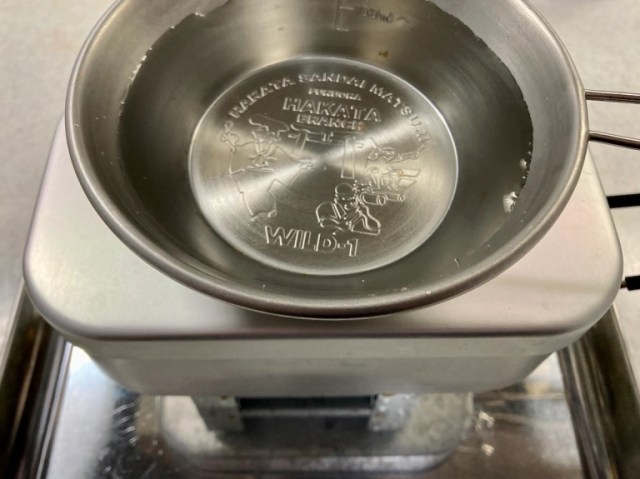
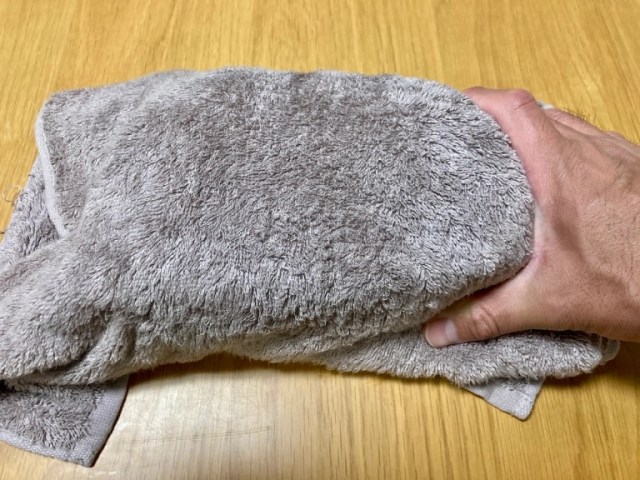

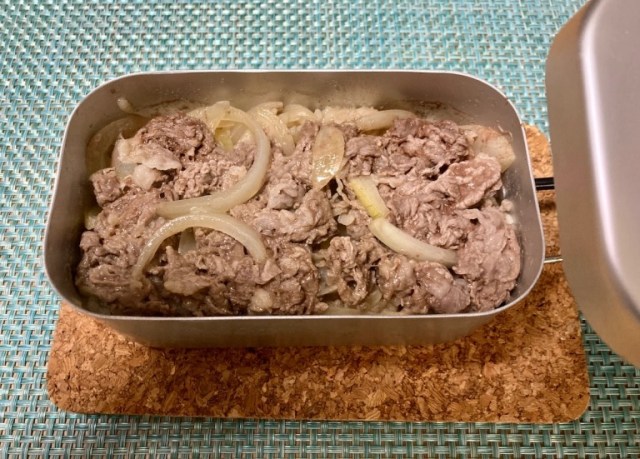
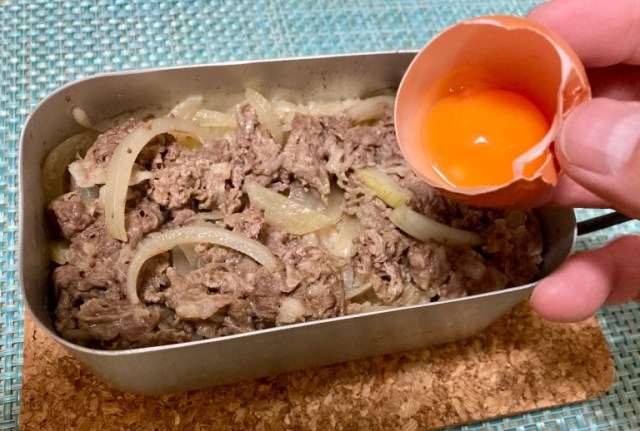
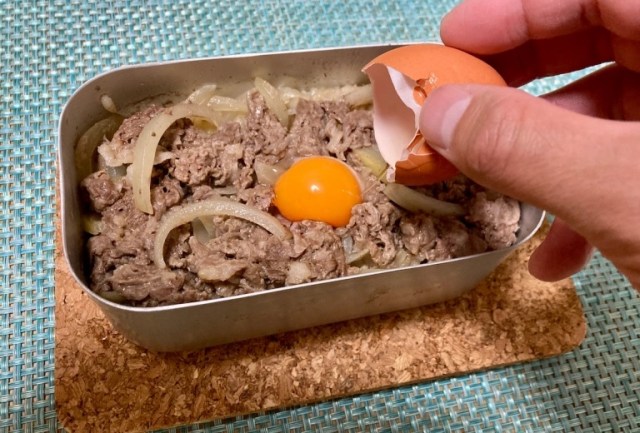
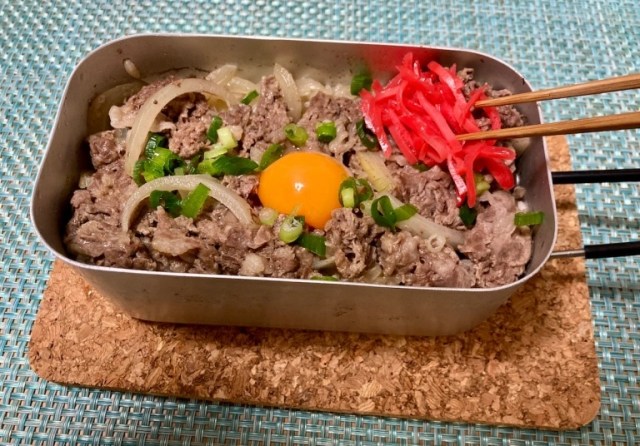
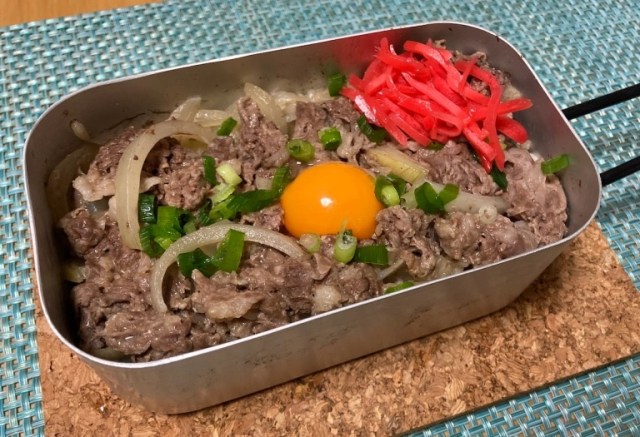
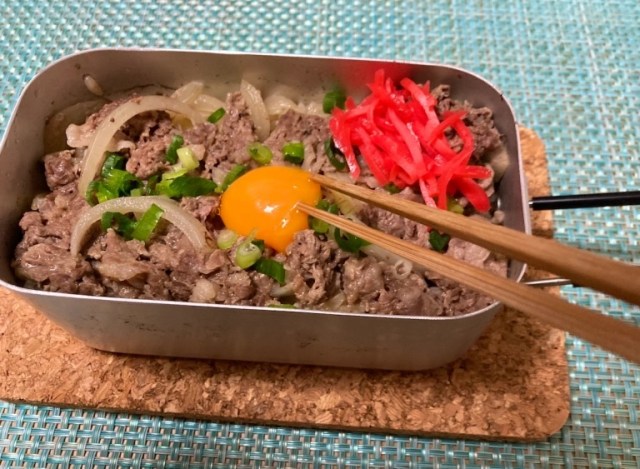
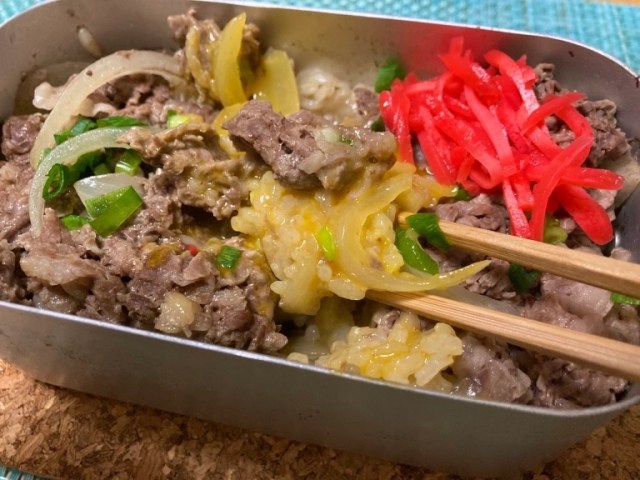
 Beef bowl chain shows how to turn gyudon into cheese-tastic baked doria with almost no effort
Beef bowl chain shows how to turn gyudon into cheese-tastic baked doria with almost no effort We try an easy, cheesy, Italian-inspired camp meal using instant noodles【Recipe】
We try an easy, cheesy, Italian-inspired camp meal using instant noodles【Recipe】 Make Your Own Yoshinoya Beef Bowl at Home, Even Better Than the Original 【Recipe】
Make Your Own Yoshinoya Beef Bowl at Home, Even Better Than the Original 【Recipe】 From beef bowl to beef pouch? Taste testing Yoshinoya’s instant gyudon packs
From beef bowl to beef pouch? Taste testing Yoshinoya’s instant gyudon packs Japan’s beef bowl king, Yoshinoya, releases new line of canned, ready-to-eat beef bowls
Japan’s beef bowl king, Yoshinoya, releases new line of canned, ready-to-eat beef bowls Japan’s newest Shinkansen has no seats…or passengers [Video]
Japan’s newest Shinkansen has no seats…or passengers [Video] Foreigners accounting for over 80 percent of off-course skiers needing rescue in Japan’s Hokkaido
Foreigners accounting for over 80 percent of off-course skiers needing rescue in Japan’s Hokkaido Starbucks Japan releases new sakura goods and drinkware for cherry blossom season 2026
Starbucks Japan releases new sakura goods and drinkware for cherry blossom season 2026 Sanrio changes Hello Kitty lead designer for first time in 46 years
Sanrio changes Hello Kitty lead designer for first time in 46 years Is a snow day the perfect day to beat the crowds at a popular ramen restaurant? [Experiment]
Is a snow day the perfect day to beat the crowds at a popular ramen restaurant? [Experiment] Starbucks Japan unveils new sakura Frappuccino for cherry blossom season 2026
Starbucks Japan unveils new sakura Frappuccino for cherry blossom season 2026 Suzuki CEO tells reporters that only poor people buy his company’s cars
Suzuki CEO tells reporters that only poor people buy his company’s cars Japan’s 10 best Ferris wheels for beautiful views, as chosen by travelers【Survey】
Japan’s 10 best Ferris wheels for beautiful views, as chosen by travelers【Survey】 Swapping seats on Japan’s bullet trains is not allowed, Shinkansen operator says
Swapping seats on Japan’s bullet trains is not allowed, Shinkansen operator says Testing Japan’s fluffy mayonnaise pancake cooking hack【SoraKitchen】
Testing Japan’s fluffy mayonnaise pancake cooking hack【SoraKitchen】 Is China’s don’t-go-to-Japan warning affecting the lines at a popular Tokyo gyukatsu restaurant?
Is China’s don’t-go-to-Japan warning affecting the lines at a popular Tokyo gyukatsu restaurant? Three beautiful places to see Japan’s plum blossoms after starting your day in downtown Tokyo
Three beautiful places to see Japan’s plum blossoms after starting your day in downtown Tokyo Downloads of 39-year-old Guns N’ Roses song increase 12,166 percent thanks to Gundam
Downloads of 39-year-old Guns N’ Roses song increase 12,166 percent thanks to Gundam A look back on 40 years of Japanese schools banning stuff
A look back on 40 years of Japanese schools banning stuff New Family Mart cinema opens inside Japanese airport
New Family Mart cinema opens inside Japanese airport Take a trip to Japan’s Dododo Land, the most irritating place on Earth
Take a trip to Japan’s Dododo Land, the most irritating place on Earth Man arrested in Japan after leaving car in coin parking lot for six years, racking up three-million-yen bill
Man arrested in Japan after leaving car in coin parking lot for six years, racking up three-million-yen bill Huge Evangelion Unit-01 head appearing in lights in Japan to celebrate anime’s 30th anniversary
Huge Evangelion Unit-01 head appearing in lights in Japan to celebrate anime’s 30th anniversary Starbucks Japan releases new drinkware and goods for Valentine’s Day
Starbucks Japan releases new drinkware and goods for Valentine’s Day Japan releases first official sakura cherry blossom forecast for 2026
Japan releases first official sakura cherry blossom forecast for 2026 Archfiend Hello Kitty appears as Sanrio launches new team-up with Yu-Gi-Oh【Pics】
Archfiend Hello Kitty appears as Sanrio launches new team-up with Yu-Gi-Oh【Pics】 China’s don’t-go-to-Japan warning looks to be affecting tourist crowds on Miyajima
China’s don’t-go-to-Japan warning looks to be affecting tourist crowds on Miyajima Studio Ghibli releases new “komorebi” plush toys from Princess Mononoke and Spirited Away
Studio Ghibli releases new “komorebi” plush toys from Princess Mononoke and Spirited Away Yokai are descending upon Tokyo this spring in the latest immersive art experience
Yokai are descending upon Tokyo this spring in the latest immersive art experience Japan’s Naruto theme park now offering real-world version of Minato’s kunai ninja weapon
Japan’s Naruto theme park now offering real-world version of Minato’s kunai ninja weapon Survey asks foreign tourists what bothered them in Japan, more than half gave same answer
Survey asks foreign tourists what bothered them in Japan, more than half gave same answer Japan’s human washing machines will go on sale to general public, demos to be held in Tokyo
Japan’s human washing machines will go on sale to general public, demos to be held in Tokyo We deeply regret going into this tunnel on our walk in the mountains of Japan
We deeply regret going into this tunnel on our walk in the mountains of Japan Studio Ghibli releases Kodama forest spirits from Princess Mononoke to light up your home
Studio Ghibli releases Kodama forest spirits from Princess Mononoke to light up your home Major Japanese hotel chain says reservations via overseas booking sites may not be valid
Major Japanese hotel chain says reservations via overseas booking sites may not be valid Put sesame oil in your coffee? Japanese maker says it’s the best way to start your day【Taste test】
Put sesame oil in your coffee? Japanese maker says it’s the best way to start your day【Taste test】 No more using real katana for tourism activities, Japan’s National Police Agency says
No more using real katana for tourism activities, Japan’s National Police Agency says Starbucks Japan reveals new sakura drinkware collection, inspired by evening cherry blossoms
Starbucks Japan reveals new sakura drinkware collection, inspired by evening cherry blossoms How to make a mouth-watering Japanese beef bowl in just five minutes 【RocketKitchen】
How to make a mouth-watering Japanese beef bowl in just five minutes 【RocketKitchen】 Secret way Yoshinoya’s president customizes his beef bowl orders is a secret no more【Taste test】
Secret way Yoshinoya’s president customizes his beef bowl orders is a secret no more【Taste test】 Tsukimi Moon-Viewing season begins in Japan with new Yoshinoya gyudon beef bowls
Tsukimi Moon-Viewing season begins in Japan with new Yoshinoya gyudon beef bowls The best way to eat a gyudon beef bowl, according to staff at Yoshinoya
The best way to eat a gyudon beef bowl, according to staff at Yoshinoya Mix-and-matching Yoshinoya, Matsuya, and Sukiya to create the ultimate beef bowl【Taste test】
Mix-and-matching Yoshinoya, Matsuya, and Sukiya to create the ultimate beef bowl【Taste test】 Japanese beef bowl chain Yoshinoya releases new canned, ready-to-eat rice bowls 【Taste Test】
Japanese beef bowl chain Yoshinoya releases new canned, ready-to-eat rice bowls 【Taste Test】 What happens when you accidentally put a gyudon beef bowl meal through the washing machine
What happens when you accidentally put a gyudon beef bowl meal through the washing machine Adventures in Gyudon: We order all seven toppings at Japanese beef bowl chain Sukiya
Adventures in Gyudon: We order all seven toppings at Japanese beef bowl chain Sukiya Sukiya celebrates Tsukimi Moon-Viewing season with limited-edition gyudon beef bowls in Japan
Sukiya celebrates Tsukimi Moon-Viewing season with limited-edition gyudon beef bowls in Japan We make our own version of Japan’s new Yakisoba Gyudon Omu Curry MIX bowl
We make our own version of Japan’s new Yakisoba Gyudon Omu Curry MIX bowl The gyudon beef bowl that cooks itself in a box like magic
The gyudon beef bowl that cooks itself in a box like magic Which Japanese beef bowl chain’s near-identical demon grater onioroshi ponzu gyudon is the best?
Which Japanese beef bowl chain’s near-identical demon grater onioroshi ponzu gyudon is the best? Japanese beef bowl vending machine serves up…gyudon rice burgers?!?
Japanese beef bowl vending machine serves up…gyudon rice burgers?!? New fried take on Yoshinoya’s original beef bowl really hits the spot! 【Recipe】
New fried take on Yoshinoya’s original beef bowl really hits the spot! 【Recipe】 Make matcha ice cream rice in your rice cooker with this easy recipe from Meiji
Make matcha ice cream rice in your rice cooker with this easy recipe from Meiji
Leave a Reply